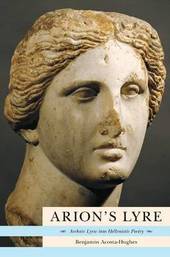
|
Arion's Lyre: Archaic Lyric into Hellenistic Poetry
Hardback
Main Details
| Title |
Arion's Lyre: Archaic Lyric into Hellenistic Poetry
|
| Authors and Contributors |
By (author) Benjamin Acosta-Hughes
|
| Physical Properties |
| Format:Hardback | | Pages:248 | | Dimensions(mm): Height 235,Width 152 |
|
| Category/Genre | Geography |
|---|
| ISBN/Barcode |
9780691095257
|
| Classifications | Dewey:884.0109 |
|---|
| Audience | | Undergraduate | | Postgraduate, Research & Scholarly | | Professional & Vocational | |
|---|
|
Publishing Details |
| Publisher |
Princeton University Press
|
| Imprint |
Princeton University Press
|
| Publication Date |
24 January 2010 |
| Publication Country |
United States
|
Description
Arion's Lyre examines how Hellenistic poetic culture adapted, reinterpreted, and transformed Archaic Greek lyric through a complex process of textual, cultural, and creative reception. Looking at the ways in which the poetry of Sappho, Alcaeus, Ibycus, Anacreon, and Simonides was preserved, edited, and read by Hellenistic scholars and poets, the book shows that Archaic poets often look very different in the new social, cultural, and political setting of Hellenistic Alexandria. For example, the Alexandrian Sappho evolves from the singer of Archaic Lesbos but has distinct associations and contexts, from Ptolemaic politics and Macedonian queens to the new phenomenon of the poetry book and an Alexandrian scholarship intent on preservation and codification. A study of Hellenistic poetic culture and an interpretation of some of the Archaic poets it so lovingly preserved, Arion's Lyre is also an examination of how one poetic culture reads another--and how modern readings of ancient poetry are filtered and shaped by earlier readings.
Author Biography
Benjamin Acosta-Hughes is professor of Greek and Latin at Ohio State University. He is the author of "Polyeideia: The Iambi of Callimachus and the Archaic Iambic Tradition".
Reviews"[T]his is a very important contribution to both Hellenistic poetry and archaic lyric. It offers copious material for further discussion on textual problems and interpretative approaches."--Flora P. Manakidou, European Legacy
|